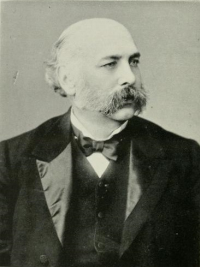Lyttleton Winslow
Full name: Lyttleton Stewart Forbes Winslow
| Born |
Subscribe now
This information and data is not available because you are not our subscriber yet.
Please click here and get full access to the entire database! |
|---|---|
| Died | |
| Plays | |
| Bio | Lyttelton Stewart Forbes Winslow MRCP was a British psychiatrist famous for his involvement in the Jack the Ripper and Georgina Weldon cases during the late Victorian era. He had two appearance in Wimbledon(1879, 1889). Born in Marylebone in London, the son of psychiatrist Forbes Benignus Winslow and Susan Winslow née Holt, Winslow was possibly the most controversial psychiatrist of his time. As a boy he was brought up in lunatic asylums owned by his father, and was educated at Rugby School and Gonville and Caius College, Cambridge, transferring to Downing College at the University of Cambridge after four terms, where he took the MB degree in 1870. He was also a DCL(1873) of Trinity College Oxford and LL.D. of Cambridge University. A keen cricketer, Winslow captained the Downing College XI. In July 1864 he was a member of the MCC team which played against South Wales, in which team was W. G. Grace. His older brother was the Revd Forbes Edward Winslow, the vicar of Epping, while his sister, Susanna Frances, married the humorist Arthur William à Beckett. Forbes Winslow published his memoirs, Recollections of Forty Years, in 1910, and also wrote the Handbook For Attendants on the Insane. He founded the British Hospital for Mental Disorders in London,[8] and was a lecturer on insanity at Charing Cross Hospital and was a physician to the West End Hospital and the North London Hospital for Consumption.[7] A member of the Marylebone Cricket Club (MCC) and a Vice-President of the Psycho-Therapeutic Society, he married twice. In the 1880s, he was the owner of the famous progenitor of the modern English Mastiff, Ch. Crown Prince.[14] On his death at his home in Devonshire Street, Portland Place, London of a heart attack aged 69 in 1913 he left a widow, three sons and a daughter, Dulcie Sylvia, who in 1906 married Roland St. John Braddell (1880–1966). Winslow appears as the central figure in the 2003 novel A Handbook for Attendants on the Insane. In 1871 he was appointed a Member of the Royal College of Physicians (MRCP). He spent his medical career in an attempt to persuade the courts that crime and alcoholism were the result of mental instability. His attempt in 1878 to have Mrs Georgina Weldon committed as a lunatic at the instigation of her estranged husband William Weldon resulted in one of the most notorious court cases of the nineteenth century. The public notoriety the Weldon case caused earned him the displeasure of the medical establishment, which continued even after his death. He became an adherent of the benefits of hypnotism in dealing with psychiatric cases. He took an active role in securing a reprieve for the four people sentenced to death for the murder by starvation of Mrs. Staunton at Penge in 1877. In 1878 he inquired into the mental condition of the Rev. Mr. Dodwell, who had shot at Sir George Jessel, the Master of the Rolls. Other trials in which Winslow was involved were those of Percy Lefroy Mapleton, convicted of the murder on the Brighton line; that of Florence Maybrick, and that of Amelia Dyer, the Reading baby farmer. He also appeared in many civil actions. |
| Tournament | AO | RG | W | US | Win-Loss |
|---|---|---|---|---|---|
|
Subscribe now
This information and data is not available because you are not our subscriber yet.
Please click here and get full access to the entire database! |
|||||
